Sexual Transmitted Infections (STI) is a common and serious problem worldwide. The most widely acknowledged are gonorrhea, syphilis and the human immunodeficiency virus (HIV). Many of these are curable with effective treatment, but they continue to be a major public health concern in the general population, particularly in vulnerable groups e.g. IDP communities.
Syndromic case management offers many benefits in this effort. It enables STI service providers to diagnose STI syndrome and treat patients on the spot, without waiting for the results of time consuming and costly laboratory tests. By offering treatment on the patient's first visit, it will help to prevent the further spread of STIs. It is also involved in patient education about the infection, how STIs are transmitted, the risky sexual behavior and how to reduce the risks, partner management and the provision of condoms.

The UNFPA supported project, involves strengthening Behavior Change Communication and Information Education and Communication for vulnerable groups, strengthening Reproductive Health and STI services through capacity building of health care providers in Puntland.
One training were held in Bosasso in June, for 14 health workers, including certified nurses, midwives, counselors and lab technicians from the IDP settlements in Bari and Karkar Regions. Another was held in Galkayo in July, with 10 health care providers from 6 districts in Mudug and Nugal regions. The training included six days of class session and eight days for field visit in MCH. Both workshops were implemented by PNMA (Puntland Nurses and Midwives Association) and funded by UNFPA Somalia Country Office.

